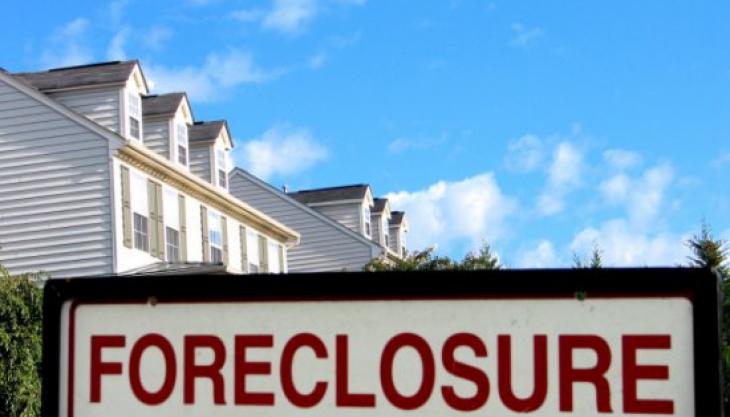Should You File Bankruptcy After a Foreclosure in North Carolina?
Submitted by Rachel R on Thu, 07/17/2014 - 1:23pm

Should bankruptcy follow foreclosure?
Image source: Flickr Creative Commons User Taber Andrew Bain
If you're facing a foreclosure in North Carolina, you may be considering filing bankruptcy to buy you some additional time in the home. A Chapter 13 can allow you time to get caught up on payments and a Chapter 7 can buy you a temporary stay of three to twelve months to stay put and save up to move. But what happens if you don't want to stall the foreclosure and just let it go ahead and happen? Do you still need bankruptcy protection? Maybe. Here's why.
What Is a Mortgage Deficiency?
Your mortgage balance is how much you owe on your home to your lender. If you have a second or third mortgage, these are all liabilities against your home. If your home is sold at foreclosure or in a short sale to forestall foreclosure, the amount of the sale is applied to your mortgage balance(s) and any remaining amount is known as a mortgage deficiency. Some lenders may choose to pursue you to try and collect this deficiency. This can be problematic when you're trying to get a fresh start.
When Are Lenders Blocked from Pursuing a Deficiency Judgment?
If a lender wants to collect the deficiency balance, they will sue you to seek a judgment for the amount owed. There are two ways to be foreclosed on in North Carolina – judicial and nonjudicial proceedings. A nonjudicial proceeding is one that doesn't have to go through the court system and is allowed by state law and the mortgage documents you signed. In North Carolina, deficiency judgments are not allowed for certain scenarios including these that apply to a mortgage on your primary residence:
(1) If you had a “purchase money mortgage” (i.e. owner financed mortgage) that was foreclosed in a nonjudicial proceeding
(2) If you had a non-traditional or rate spread mortgage taken out before January 2010 that was foreclosed nonjudicially
(3) If you had a non-traditional or rate spread mortgage taken out after January 2010 that was foreclosed on in either manner
How to Fight a Deficiency Judgment
If you don't want to file bankruptcy and your lender is suing you for the deficiency balance, your main defense will be the home's fair market value. If your lender was the one that purchased your home at the foreclosure sale, you can fight to have some or all of the deficiency excluded. For instance, if your mortgage balance was $150,000 and it sold at foreclosure for $100,000, the deficiency is $50,000. But if you can show that the fair market value of the home is $150,000, you shouldn't owe a deficiency. $150,000 mortgage balance - $150,000 home value = $0 deficiency because the lender lost out on a $150k mortgage but gained a $150k asset.
How Bankruptcy Can Help After Foreclosure
After foreclosure, it's not just a potential primary mortgage deficiency that you may be facing. If you had a second mortgage on your residence, that lender may also come after you. And if you weren't able to pay your mortgage payments, you likely also were struggling with other bills. You may owe credit card bills, Homeowner's Association fees and other debts. Filing bankruptcy eradicates all of these and other unsecured debts like medical bills as well. If your lender is pursuing you for a deficiency balance and the home's fair market value offers little (or no) defense, filing a Chapter 7 will get you a clean slate without the threat of this hanging over your head but you should file right away as soon as you get notice of the suit.
For more information on how bankruptcy can protect you in the aftermath of a foreclosure and get you a financial fresh start that will get on the road to recovery and future home ownership, contact the North Carolina bankruptcy professionals at the law offices of John T Orcutt.
Debts Hurt! Got debt? Need help? Get started below!
Serving All of North Carolina
- Bankruptcy Attorneys Raleigh NC (North)
- Bankruptcy Attorney Fayetteville NC
- Bankruptcy Attorney Durham NC
- Bankruptcy Attorneys Wilson NC
- Bankruptcy Attorneys Greensboro NC
- Bankruptcy Attorneys Southport NC
- Bankruptcy Attorneys Wilmington NC
Bankruptcy Attorneys Raleigh NC (North)
6616 Six Forks Rd #203 Raleigh, NC 27615 North Carolina
Tel: (919) 847-9750

Bankruptcy Attorney Fayetteville NC
2711 Breezewood Ave Fayetteville, NC 28303 North Carolina
Tel: (910) 323-2972

Bankruptcy Attorney Durham NC
1738 Hillandale Rd Suite D Durham, NC 27705 North Carolina
Tel: (919) 286-1695


Bankruptcy Attorneys Greensboro NC
2100 W Cornwallis Dr. STE O Greensboro, NC 27408 North Carolina
Tel: (336) 542-5993

Bankruptcy Attorneys Southport NC
116 N Howe St. Suite A Southport, NC 28461 North Carolina
Tel: (910) 218-8682

Bankruptcy Attorneys Wilmington NC
116 N. Howe Street, Suite A Southport, NC 28461 North Carolina
Tel: (910) 447-2987
